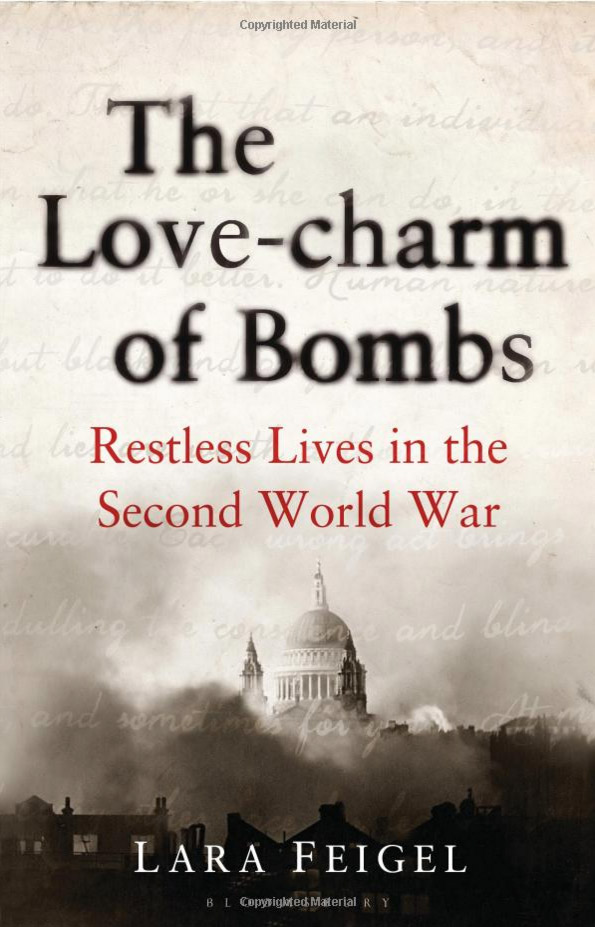
‘The nightly routine of sirens, barrage, the probing raider, the unmistakable engine (“Where are you? Where are you? Where are you?”), the bomb-bursts moving nearer and then moving away, hold one like a love-charm.’
Graham Greene
The Love-charm of Bombs
Bloomsbury, January 2013
Buy in the UK Buy in the US Read an extractWhen the first bombs fell on London in August 1940, the city was transformed overnight into a battlefront. For most Londoners, the sirens, guns, planes and bombs heralded gruelling nights of sleeplessness, fear and loss. But for Graham Greene and some of his contemporaries, this was a bizarrely euphoric time when London became the setting for intense love affairs and surreal beauty. At the height of the Blitz, Greene described the bomb-bursts as holding one ‘like a love-charm’. As the sky whistled and the ground shook, nerves were tested, loyalties were examined and infidelities begun.
The Love-charm of Bombs is a powerful wartime chronicle told through eyes of five prominent writers: Elizabeth Bowen, Graham Greene, Rose Macaulay, Hilde Spiel and Henry Yorke (writing as Henry Green). Volunteering as ambulance drivers, fire-fighters and ARP wardens, these were the successors to the soldier poets of the First World War and their story has never been told. Now, opening with a meticulous evocation of a single night in September 1940, Lara Feigel interweaves letters, diaries and fiction with official civil defence records to chart the history of a burning world in wartime London and postwar Vienna and Berlin. She reveals the haunting, ecstatic, often wrenching stories that triumphed amid the mess of a war-torn world.
From the reviews:
‘An original and ingenious recreation of the Second World War in London as experienced through the lives of writers who also fought fires, drove ambulances or worked in the Ministry of Information … This is a highly readable interweaving of their individual stories, shocking, enjoyable, full of surprises’ Michael Holroyd
‘A strikingly original book. It succeeds in its ambitious combination of group biography and literary criticism … The Love-charm of Bombs excels in demonstrating that these years of bleakness and loss were also, for a fortunate few, a time of extraordinary excitement and literary aspiration’ Economist
‘[A] fascinating and brilliantly researched group biography … an extraordinary tapestry of life in wartime, from September 1940 in London to the ruins of postwar Europe … This is a glorious mixture of history, literature and riveting gossip about war as – yes – an aphrodisiac … what remains with you at the end of this engaging book is the sense that Larkin was right, and that after the bombs, after the grieving, ‘what will survive of us is love’’ Bel Mooney, Daily Mail
‘Feigel has written a wonderful book in a critical genre in which she is a pioneer. There will, for sure, be more works of “new biography”. Let’s hope they are as good as this one’ John Sutherland, New Statesman
‘Feigel writes with modesty and grace, never patronises or sentimentalises her subjects, and makes the reader glad to be sharing her ideas. The Love-Charm of Bombs is a bounding success as an account of wartime London and as a study of highly strung but tough characters under stress … I haven’t for many a year read a book of literary scholarship with such impatience to know what happens next’ Richard Davenport-Hines, Sunday Telegraph
‘As an account of life in London under bombardment and as an examination of how a handful of gifted writers responded to the stress and anxiety of war, Ms. Feigel’s intelligent and lucidly written book is continuously interesting and illuminating’ Allan Massie, Wall Street Journal
‘Lara Feigel’s ambitious fusion of criticism and biography … The Love-Charm of Bombs is a richly layered work … Her writing radiates with poignance and insight’ Matthew Price, Boston Globe
‘A lovingly researched book that focuses on the experiences of five writers living in London during those suspenseful months … This is an enterprising, lively and original work, full of striking cameos and fresh insights’ Miranda Seymour, New York Times
‘One pleasure of this brave and original book is seeing these lives overlap, mirror each other, and diverge … Feigel shows the English in a new light: not cold or repressed, but a sensuous people for whom love matters most of all. She also shows why the period from September 1940 to May 1941, when we stood alone against the powers of darkness, remains the defining moment in our recent history’ Peter J. Conradi, Independent
‘Full of good things, clearly expressed, and captures well the strange euphoria of war, and the equally unexpected sense of dreariness when it is over’ Craig Brown, Mail on Sunday
‘A fine account … An absorbing and well-researched group biography of five prominent writers’ Robert McCrum, Observer
‘Intelligently written, seamlessly presented, and with something of the quality of a tapestry’ Nicholas Shakespeare, Daily Telegraph
‘Reads like an apocalyptic thriller … A fine book that brings the writers of the Second World War into the spotlight … The breadth and depth of Feigel’s research is admirable, but this is not a dry account of famous lives. Her love and curiosity about her subjects is palpable and her writing style is simple but affecting… A thrilling insight to each writer’s response to war, both published and private’ Shirley Whiteside, Independent on Sunday
‘A skillfully composed group portrait … Feigel is a good storyteller and responsive to the nuances of expression in the period’ Tessa Hadley, Guardian
‘Scintillating account of the lives of London litterateurs during the Blitz’ Scotsman
‘Feigel’s method of juxtaposing writers in London brings out the drama and accidents of wartime, while her well-documented historical research supports both a detailed account of the German air raids and a broader outline of progress of the war’ Lindsay Duguid, Times Literary Supplement
‘Inspired … Feigel had an immense task in shaping these extraordinary stories of love, war and creativity. The later sections of Feigel’s elegantly written, multifocal biography have the charm of a maze’ Brenda Niall, Sydney Morning Herald
‘It reads like a novel because there’s great intimacy in this fugue-like composition of writers and their books and world events. Feigel has an ear for her subjects’ individual voices, an eye for detail, a feel for contiguities and for the city of London. After the frenzy and intoxication of war, the dénouement of Bowen and Macaulay and Spiel, Greene and Yorke and their entourage of family and lovers, all coming to terms with the end of an era, all spent and striving to renew: that is the most moving and revealing section of this extraordinary book’ Evelyn Juers, The Australian
‘This vivid, powerful and deeply original book has rewritten conventional accounts of war on the home front in a profound and unforgettable way’ Juliet Gardiner

